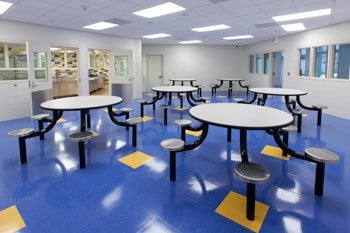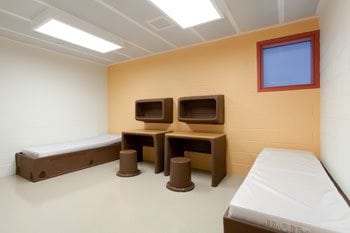Case Study: Juvenile Justice Center Updates “Antiquated” Facility with Help from Norix Furniture
 In an effort to replace a 50-year-old study center that no longer served the needs of the youths who were housed there, the city of Philadelphia recently opened a Juvenile Justice Services Center (JJSC) that provides a residential educational setting with the necessary security components.
In an effort to replace a 50-year-old study center that no longer served the needs of the youths who were housed there, the city of Philadelphia recently opened a Juvenile Justice Services Center (JJSC) that provides a residential educational setting with the necessary security components.
“The old Youth Study center was well beyond its useful life,” James Lowe, project Director for the city’s Department of Public Property, said. “Changes in the operations and types of services provided for today’s youth necessitated spaces that are efficient in the delivery of those services.”
The JJSC serves as a juvenile detention center for pre-adjudicated youths aged 13-20, and allows them to attend school while in custody awaiting disposition of their cases. The 5-acre site is located in an urban area, and the city felt the new facility should integrate architecturally with the two-story brick row houses that dominate the neighborhood. The city’s objective also was to create a safe and secure environment conducive to learning.
Furniture was an important component to the facility. Officials and architects wanted furniture that could be securely anchored to the floor or wall, with no gaps in construction to allow the concealment of contraband. Additionally, they needed products that were extremely durable, with surfaces that are easy to clean and maintain, and that had rounded edges for safety and security. The furniture also needed to be aesthetically pleasing and be an integral component in the plan to create a productive educational institution.
During the design phase, Norix consultative sales specialists Joe Eustace and Dave MacKinnon presented furniture recommendations to the design team and decision makers from DHS/Juvenile Justice that were consistent with the facility’s operational requirements. Specifications were established with Norix Attenda® Series molded dormitory furniture as basis of design. Throughout the multiple phases of the project, the Norix sales specialists presented the transition team with a wide variety of furniture options for sleeping rooms, classrooms, dayrooms and dining areas.
Hondo® Series seating was selected for the dayrooms – based on the comfort, durability and seamless construction – along with X-Base Tables and Integra chairs. Max-Master® tables were selected for the dining areas for superior stability and security. A Norix professional installation team installed the furnishings in the fall of 2012.
 The $110 million Philadelphia Juvenile Justice Services Center opened in December 2012. The new facility has dormitory spaces for 192 juveniles, 10 classrooms for the educational programs directed by the School District of Philadelphia, two courtrooms with judges’ chambers, and conference rooms for visitation and programs administered by social-services providers. It also includes a wellness clinic, gymnasium, outdoor recreation spaces and a garden (not typical in a detention environment.)
The $110 million Philadelphia Juvenile Justice Services Center opened in December 2012. The new facility has dormitory spaces for 192 juveniles, 10 classrooms for the educational programs directed by the School District of Philadelphia, two courtrooms with judges’ chambers, and conference rooms for visitation and programs administered by social-services providers. It also includes a wellness clinic, gymnasium, outdoor recreation spaces and a garden (not typical in a detention environment.)
“The facility is bright and cheerful while maintaining the safeguards and welfare of the community,” Lowe said. “This education-oriented juvenile facility focuses on providing spaces where youth counselors are given the technology and environment to utilize their skills in working with youth to encourage positive behaviors.”
To learn more about this featured installation and the Norix products that were installed there, download our Philadelphia Juvenile Justice Services Center Case Study.
Dustin Coleman is a brand journalist for Norix Furniture and a contributor to the Safe Environments blog.